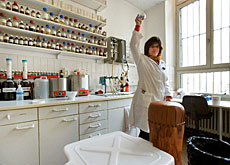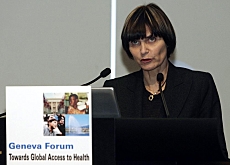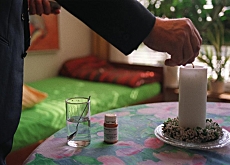The changing face of illness in society

On Swiss Day of the Sick, historian of medicine Vincent Barras tells swissinfo how the relationship between society and illness has evolved over the centuries.
This year’s event is devoted to people with incurable and chronic diseases and has as its slogan “Why me?”
It is a question that people have asked throughout the ages. Barras has studied medical notes from ancient Greece, as well as anatomical works and letters from patients during the Age of Enlightenment, to learn more about the ongoing battle between humans and disease.
Barras, director of the Institute of the History of Medicine and Public Health at Lausanne University Hospital, believes there is only one certainty regarding medicine today: it involves more people than ever, from insurers and lawyers to ethicists and theologians.
swissinfo: What does it mean nowadays “to be ill” compared with 50 or even 100 years ago?
Vincent Barras: There are in fact two aspects to a disease: first of all, it can always be described as a limitation of the corporal and physical possibilities of human beings.
But at the same time, being ill today is fundamentally different from being ill in 1907 or in 1957. Interaction between the individual and the world is in effect subject to cultural and social variations.
swissinfo: For example?
V.B.: Today having limited sexual stamina or performance is seen by society as an illness. Specific remedies have been created to deal with this type of “deficiency” and the person involved can therefore feel that they have an illness – which was not the case a century ago. This issue did not emerge as a social problem.
swissinfo: Does the way in which a sick person lives with a disease also depend on the social context?
V.B.: In effect, yes. Having pneumonia today – apart from the fact that the chances of being cured are better – is nothing like having pneumonia 100 or 200 years ago, for either the patient or society. Dying of an infectious disease is much more of a social scandal nowadays.
swissinfo: In the days when people with tuberculosis used to travel by train to the Swiss Alps, the other passengers would leave the carriages…
V.B.: Coming to treatments in the Alps to benefit from the “good air”, as people called it, was the only known means of relief. Those with the disease saw it as a curse, but they lived with it in a very different way compared with today.
swissinfo: You have also studied the letters of patients in the 18th century. How did one live with diseases then?
V.B.: These letters prove that the meaning of diseases has changed over the centuries. One sees that patients used to accommodate their ills more easily with the events in their lives – but also with the climate and with nature.
Besides, in those days people used to have more chronic, longer-term diseases such as gout. They therefore “negotiated” with the pain – they integrated it into their lives from day to day and were attuned to the slightest thing likely to provide relief. This aspect is much less common nowadays.
swissinfo: For a long time religion and medicine were closely related. What are the consequences now that this is less the case?
V.B.: The fact that we now live in a world governed by secular laws completely alters the relationship between suffering and death. Today the way of living with an illness has been largely secularised. Even believers live with disease on two levels: they take their pills, but they also feel helped – or indeed abandoned – by their god.
swissinfo: And what about technological progress? Has that not helped patients and society accept illness?
V.B.: On the contrary – it has resulted in people accepting the illness less… If you’ve got an army at your disposal, you don’t use it to accept your enemy but to reject it!
At the individual level, reports on this subject would suggest in my opinion that few people have total confidence in technology. This could provoke anxiety, which is a new feeling regarding illness.
swissinfo: Another novelty is the concept of “patient rights”. When did this appear?
V.B.: When the paternalistic model of medicine lost its power in the 1950s. Today the patient is no longer just an “object” at the end of a bed opposite an omniscient doctor. On the contrary, patients now have rights over their bodies and health. This has resulted in new behaviours, such as trials for medical negligence.
swissinfo-interview: Carole Wälti
The idea of a Swiss “Day of the Sick” was launched in 1939 by Marthe Nicati, a doctor specialising in pulmonary diseases.
On the eve of the Second World War, Nicati travelled to Leysin, an alpine village in canton Vaud known for its sanatoria. Thousands of people with tuberculosis would go therefore hoping to be cured.
Seeing that the sufferers were often neglected if not forgotten by their parents, Nicati wanted to create a day in their honour and invited healthy people to think of ill people on the first Sunday of every March.
In 1943 the day was made official across Switzerland. It is customary for the Swiss president to deliver a speech.
World Day of the Sick, initiated by Pope John Paul II in 1992, takes place on February 11.
Swiss President Micheline Calmy-Rey spoke to the Swiss on public radio and television for the Day of the Sick.
She warned that illness was a fact of life despite medical progress. “Each of us can fall ill, each of us has a family member who is sick,” she said.
She added that the day’s “Why me?” theme was also aimed at those in good health, because one day or another, everyone falls ill.
She called on the Swiss to visit or get in touch with a sick person.
Calmy-Rey also pointed out the huge differences in healthcare around the world, differences she judges to be “shocking”.

In compliance with the JTI standards
More: SWI swissinfo.ch certified by the Journalism Trust Initiative



You can find an overview of ongoing debates with our journalists here . Please join us!
If you want to start a conversation about a topic raised in this article or want to report factual errors, email us at english@swissinfo.ch.